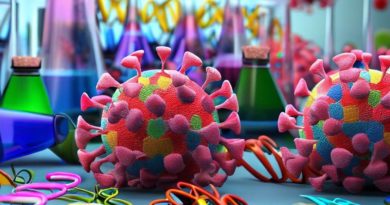As Covid Cases Rise, So, Inevitably Do Conspiracy Theories
In what might be described as a logic see-saw, as covid cases rise, rational discussion about the virus falls and a wave of new conspiracy theories about mass lockdowns and world events is hitting, the New York Times reports. As this happens, Threads blocks searches for “covid” and “long covid.”
The New York Times: As Covid-19 Cases Tick Higher, Conspiracy Theorists Stoke New Fears
As Covid-19 cases have climbed as part of a late-summer uptick, right-wing influencers and conspiracy theorists have responded by stoking fears about mass lockdowns and spreading unsubstantiated new ideas about Covid-19’s links to world events. “Do they want Covid measures back to put us on war footing in preparation for the war with Russia?” Jack Posobiec, a right-wing personality, said to more than 150,000 followers on his Telegram channel. … The use of “plandemic” and “scamdemic” — two terms describing Covid-19 as a ruse — rose sharply in August on right-wing websites, according to data from Pyrra, a company that monitors threats and misinformation on alternative social networks. (Thompson, 9/11)
The Washington Post: Threads Blocks Searches For ‘Covid’ And ‘Long Covid’
Instagram’s text-based social platform Threads last week rolled out its new search function, a crucial step toward the platform’s expansion and one that would give it more parity with X, formerly known as Twitter. Not even 24 hours later, the company was embroiled in controversy. When users went to Threads to search for content related to “covid” and “long covid,” they were met with a blank screen that showed no search results and a pop-up linking to the website of the Centers for Disease Control and Prevention. (Lorenz, 9/11)
More on the covid surge —
ABC News: Why Florida Is Seeing The Highest Proportion Of Counties With ‘Moderate’ COVID Hospitalization Rates
As COVID-19 hospitalizations rise across the country, Florida is seeing higher admissions levels than other states. As of Monday, 43 of Florida’s 67 counties reported moderate levels of weekly new hospital admissions for COVID-19 — a higher proportion than any other state in the U.S., data from the Centers for Disease Control and Prevention shows. (Kekatos, 9/12)
Quartz: How Worried Should We Be About The Uptick In Covid Cases?
Quartz spoke with Shaun Truelove, an associate scientist at the Johns Hopkins Bloomberg School of Public Health, to understand what’s happening now. Truelove is an infectious disease epidemiologist who runs a team that updates the covid scenario modeling hub, which builds on previous Johns Hopkins covid tracking efforts to create long-term scenario projections in the US. The projections help decision makers determine the impacts of covid for the next four to six months. (Diaz, 9/11)
Wired: Yes, There’s A New Covid Variant. No, You Shouldn’t Panic
The Pirola Covid variant has an alarming number of mutations, but it doesn’t seem to be taking hold or causing severe illness. (Browne, 9/11)
The New York Times: In Schools, An Invisible Threat Becomes Clear
Apoorva Mandavilli, a health and science reporter for The New York Times, traveled across the country to learn how educators are preparing for the next pandemic. (Ocampo, 9/7)
On covid’s link to diabetes —
CIDRAP: SARS-CoV-2 Infections May Trigger Islet Autoantibodies In Kids At Risk For Diabetes
Children with a high genetic risk of developing type 1 diabetes see an increase in islet autoantibodies, which develop against pancreatic β-cell proteins, shortly after infection with SARS-CoV-2, illustrating a temporal relationship between COVID-19 and islet autoantibodies not seen with influenza. The study was published in JAMA. … Of 885 children who agreed to participate in the study, SARS-CoV-2 antibodies developed in 170 children at a median age of 18 months, and islet autoantibodies developed in 60 children. Six of the 60 children tested positive for islet autoantibodies and SARS-CoV-2 antibodies at the same time, and six tested positive for islet antibodies after having tested positive for SARS-CoV-2 antibodies 2 to 6 months earlier. (Soucheray, 9/11)
This is part of the Morning Briefing, a summary of health policy coverage from major news organizations. Sign up for an email subscription.
This article has been archived for your research. The original version from KFF Health News can be found here.


